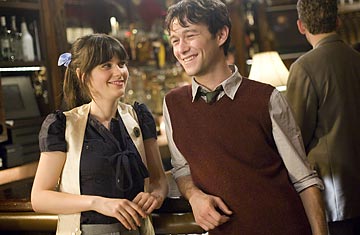
Zooey Deschanel and Joseph Gordon-Levitt in (500) Days of Summer
This is a not-quite-love letter to you, you cunning little romantic comedy. In fact, you don't need a billet-doux from me. So many other reviewers — like Owen Gleiberman at Entertainment Weekly, who gave you an A for Adorable — have sung your praises, as if you were some old pop song they can't get out of their heads. I first saw you more than a week ago, and you've been on my mind ever since. But let's not call it love.
No question, you've got a lot going for you: snazz, schmaltz, an iPod's worth of pop melodies spanning five decades and two of Hollywood's most attractive young stars, Joseph Gordon-Levitt and Zooey Deschanel, to play your leads Tom and Summer. You certainly found the right sugar daddy: the boutique distributor Fox Searchlight has made big hits of Little Miss Sunshine, Juno and Slumdog Millionaire, and you're as winsome as any of those. I also admire your timing: while the rest of the movie world is lining up for Harry Potter and His Teenage Hormones, you cozy up to the discerning sentimentalists who for months have been pining for a movie that'll make them get all smiley and warm.
Your screenwriters, Scott Neustadter and Michael H. Weber, and your direct-from-videos director Marc Webb start with this very nice guy, Tom — trained as an architect but for now writing doggerel for greeting cards. When Tom catches sight of Summer, who's just joined the staff, his head rubbernecks and his heart gets whiplash. He's been waiting for love like a winning lottery ticket, and now he thinks he can claim it.
Not so fast, Buster. Summer is friendly but somehow remote; even while going out for karaoke nights with Tom and his louche pals, she maintains a protective force field that keeps him from closing in and really touching her. Which of course makes her all the more desirable. Can't have — must have. Over 500 days, the two spend time together, explore mutual quirks, and after a while become sexual partners; but Summer doesn't want to think of them as "a couple." In time, their conversation comes to resemble the dialectic of middle-aged spouses. (She: "You're happy?" He: "You're not?" She: "We argue all the time." He: "We do not!") Obeying the law of nature, the affair blossoms, then wilts.
In your color scheme and sensibility you're as pretty as a real greeting card — something classy and flossy, the Jacquie Lawson type — but you want us to know you're smart too. So you reorder the elements of the story, hopscotching from day (1) to day (500) and back to day (83), as if you were an iPod set to Shuffle. That makes the whole thing a jumbled series of memories. You announce straight off that this is the tale of a love that's been lost, and the sole dramatic question is, Will Tom get over it? (You're like a prequel to Forgetting Sarah Marshall.) Tom is the one we're meant to bond with, and that's your main strategy. You're a woman's movie for guys: romance from the sensitive male's POV. Hey, ladies, you think we don't care? Think we don't hurt?
Think we don't like old songs and movies? Tom and Summer are in their 20s, yet their pop touchstones are the Beatles and other relics from the '60s (Simon and Garfunkel's "Bookends," Nancy Sinatra's "Sugar Town"), '70s (Bruce Springsteen) and '80s (Patrick Swayze's "She's Like the Wind" and Hall & Oates' "You Make My Dreams," which cues a full musical-production number). Summer's first clue that Tom is a potential soul mate comes when she hears the Smiths' "There Is a Light That Never Goes Out" on his iPod, with the mournful lyrics, "And if a double-decker bus/ Crashes into us,/ To die by your side/ Is such a heavenly way to die." Also from the Euro playlist is an old French love ballad, sung by French President Nicolas Sarkozy's model wife Carla Bruni! In your song selection you're like a politician who makes sure to kiss babies of every race, color and creed.
